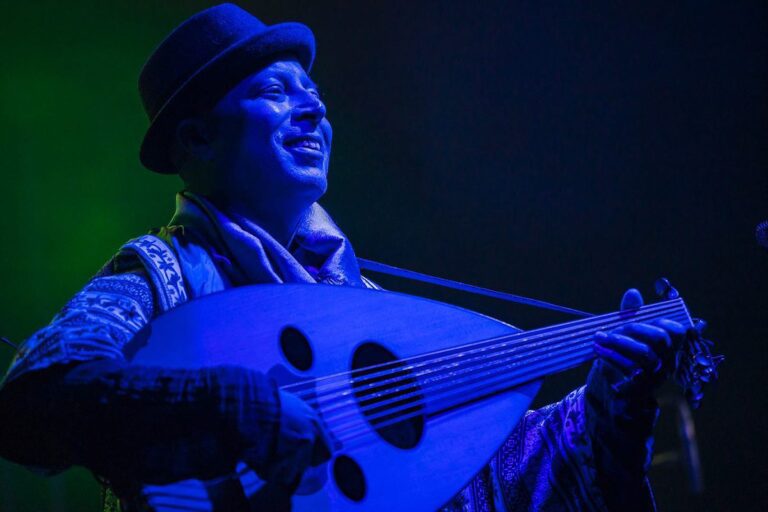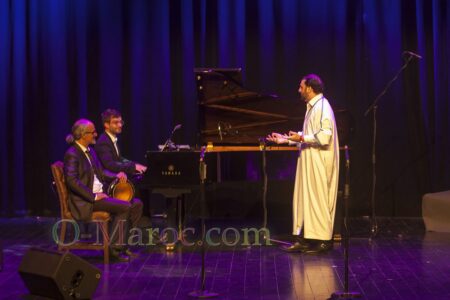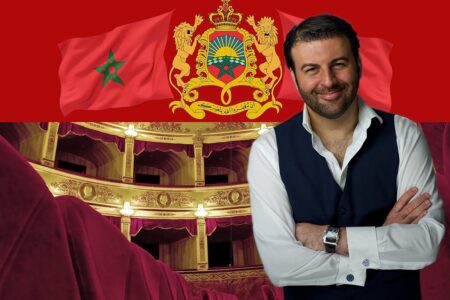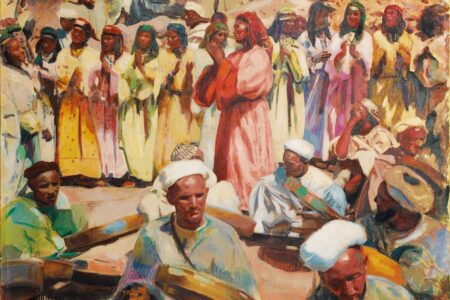While browsing through my archives, I stumbled upon a discovery I made a long time ago, on Naïm’s blog, about a remarkable Tunisian artist, Dhafer Youssef, whom I did not know anything about – and forgotten in the meantime.
It’s a big hit for this musician and singer whose works mix jazz and modern influences with an Islamic and Sufi base.
From the Koranic school to the big international stages
He was born in 1967 in a small village in the region of Monastir, the grandson of a muezzin who taught him both the Koran, the adhan (the call to prayer) and religious music, whose influence can be recognized everywhere in his songs.
As a child, he sang at weddings, listened to the radio and soaked up everything he heard: jazz, rock, classical music, Latin music, etc. and tried to reproduce the melodies on a toy he was given, a plastic guitar.
He trained at the Tunis Conservatory, where he learned the art of the oud (classical Arabic luth), and then in Syria. From there he went to Vienna, where he studied classical music discovered on the radio in his youth, then New York and Paris, before returning to Tunisia in 2010.
Although he is not directly involved in politics, his friendships, his songs, some of which are inspired by Abu Nawas and celebrate wine as well as some on his his declarations in which he affirms that he believes neither in “a perfect society”, nor in “a just religion”, nor in “paradise”, caused him difficulties at the time of the rise of Ennadha.
The titles of some of his works show the same religious “fusion” as that of his music, for example when, beyond Sufi music, he refers to the chakras. He remains a believer, convinced that his extraordinary voice is a gift from God, which he must use.
If you are a jazz musician, it is your destiny and that’s it.
His deep bass voice is everything I love
Just hearing his bass voice starting in Yabay is enough to make me stop working (hence the time it took me to write this article). His voice has, I think, remarkable power and impressive tessitura. He manages to get into the high notes with great strength, without ever shouting or using a head voice.
Soupir Eternel is something else. It begins with a few particularly calm chords, which gradually rise in the scale before the song begins.
The breath is there, with long held notes and always this incredible rise in the high notes where the voice ends up merging with the instrument.
In this one, the song modified by the fist on the chest takes us into a whole other world, that of Mongolian songs, before returning to his own universe.
And there, one (I at least) is in pure delight, with this so harmonious high notes:
He also has purely instrumental creations, where the instruments almost imitate his voice
If you want to hear his jazzy songs, you have for example this one:
He mixes on stage traditional instruments (like his oud) and jazz instruments, piano and percussions…
Dhafer Youssef and Ouled Ahmed
And then, in his many videos, I came across this one, which completely blew my mind too. After a classic start “à la Dhafer” … at the 29th second, everything changes, with the powerful words of Ouled Ahmed, a Tunisian poet.
This left-wing activist poet, opposed to Bourguiba and Ben Ali, was censored for most of his life. Born in Sidi Bouzid, like Mohamed Bouazizi, he died of cancer in 2016, just a few years after the beginning of the Arab Spring, without having opposed religious extremism with the same strength.
You can understand his text by turning on the subtitles (they are of high quality, it is a real translation). Even without understanding anything, that’s the power of poetry, this text moves you… and makes you want to learn Arabic!
This poem is “The Unconditional Republic”, which ends like that:
People, if you are a great people
Vote for yourself at the crucial moment
If you are a great people
If you covet submission after humiliation
Prepare your nation for the fatal blow…
(Excerpts from a collection of his poems, translated into French or English, can be found here).
Finally, this poetry of Ouled Ahmed reminded me of another Arab poetess, Palestinian, whose words have the same power, Farah Chamma :
 A typo or syntax error? You can select the text and hit Ctrl+Enter to send us a message. Thank you! If this post interested you, maybe you can also leave a comment. We'd love to exchange with you !
A typo or syntax error? You can select the text and hit Ctrl+Enter to send us a message. Thank you! If this post interested you, maybe you can also leave a comment. We'd love to exchange with you !




